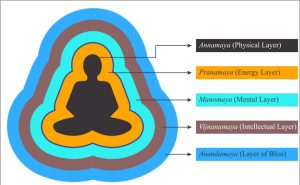Yoga, Health, and the Self
Yoga and Health 
Real health
The concept of health in yoga is not merely physical health. Health is mental as well as well as physical. The word used for health is arogya meaning, absence of factors, which irritate the mind. One essential difference between yoga and other forms of exercise is that most physical activities like sports use the arms and legs and less emphasis is on the vital organs; where are yoga concentrates more on the flexibility of the organs in the thoracic abdominal cavity.
Difference between Yogic practice and exercise
The reason for cultivation of the spine is obvious. It is said that Man is as old as his spine. Rigidity causer ill health more flexible the spine, the more likely you are to stay young and vibrant. Yoga postures are unparallel in keeping the spine flexible so this is the first principle of health in yoga. The second principle is the efficient functioning of the vital organs. Not only do the postures practiced for the spine affect these organs by promoting blood circulation and improving nutrition, but there are special exercises, which directly affect the liver, spleen, and pancreas. Uddiyana Bandha is only one example. It toner up all these organs in the abdominal cavity.
Practicing yoga is a god investment in your health, for the simple reason that, unlike other forms, of exercise, it deer not burn up energy, it conserve it. Furthermore, vigorous exercise produce toxin in the form of lactic acid, the waste product of muscle movement, and so you experience aches and pains. Yoga does not cause this kind of effect, so with the minimum of effort you get the maximum benefit.
According to the World Health Organization (WHO) the state of health is defined as a state of complete Physical, Mental, Social and Spiritual well being and not merely an absence of diseases or infirmity
Physical Dimension of Health
You have a number of physiological and structural characteristics that you can call on to aid you in accomplishing you development tasks. Among these physical characteristics are your level of susceptibility to disease, body weight, visual acuity, strength, coordination, level of endurance, and powers of recuperation. In certain situations the physical dimension of your health may be the most important dimension. Perhaps this is why many authorities have for so long equated health with the design and operation of the body.
Emotional Dimensions of Health
You also possess certain emotional characteristics that can did you as you grow and develop. The emotional dimension of health includes the degree to which your are able to cope with stress, remain flexible, and compromise to resolve conflict. Your growth and development can have associated with them some vulnerability, which may lead to feelings of rejection and failure that could reduce your overall productivity and satisfaction. People who consistently try to improve their emotional health appear to lead lives of greater enjoyment than those who left feelings of vulnerability overwhelm them or block their creativity.
Social Dimension of Health
A third dimension of total health is that of social abilities. Whether you label these as social grace, skills, or insights, you probably have much strength in this area. Because most of your growing and developing has been undertaken in the presence of others, you can appreciate how this dimensions of your health maybe a critically important factor in your life. The social abilities of many nontraditional students may already be firmly established. Entering college may encourage them to develop new social skills that help them socialize with their traditional – age student colleagues. After being on campus for a while, nontraditional students often interact comfortable with traditional students in such diverse places as the library, the student center, and the bookstore. This interaction enhances the social dimensions of health for both types of students.
Intellectual Dimension of Health
Your ability to process and act on information, clarify values and beliefs, and exercise your decision making capacity ranks among the most important aspects of total health. Coping skills, flexibility, or the knack of saying the right thing at the right time may not serve you as well as does your ability to use information or understand a new idea. Certainly a refusal to grasp new information or to undertake an analysis of your beliefs could hinder the degree of growth and development your college experience can provide.
Spiritual Dimension of Health
The fifth dimension of health is the spiritual dimension.16 although you certainly could include your religious beliefs and practices in this category, we would extend it to include your relationship to other living things, the role of a spiritual, direction in your life, the nature of human behavior, and your willingness to serve others. All are important components of spiritual health.
